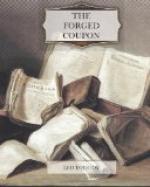Mitri crossed himself three times, turning towards the corner in which the ikons hung, and repeated some utterly meaningless words, which he called prayers, to the Trinity and the Virgin, the Creed and our Father.
“Isn’t there any water?”
“The girl’s gone for it. I’ve got some tea. Will you go up to the squire?”
“Yes, I’d better.” The smoke from the stove made him cough. He took a rag off the wooden bench and went into the porch. The girl had just come back with the water. Mitri filled his mouth with water from the pail and squirted it out on his hands, took some more in his mouth to wash his face, dried himself with the rag, then parted and smoothed his curly hair with his fingers and went out. A little girl of about ten, with nothing on but a dirty shirt, came towards him. “Good-morning, Uncle Mitri,” she said; “you are to come and thrash.” “All right, I’ll come,” replied Mitri. He understood that he was expected to return the help given the week before by Kumushkir, a man as poor as he was himself, when he was thrashing his own corn with a horse-driven machine.
“Tell them I’ll come—I’ll come at lunch time. I’ve got to go to Ugrumi.” Mitri went back to the hut, and changing his birch-bark shoes and the linen bands on his legs, started off to see the squire. After he had got three roubles from Volgin, and the same sum from Nicholas Petrovich, he returned to his house, gave the money to his wife, and went to his neighbour’s. The thrashing machine was humming, and the driver was shouting. The lean horses were going slowly round him, straining at their traces. The driver was shouting to them in a monotone, “Now, there, my dears.” Some women were unbinding sheaves, others were raking up the scattered straw and ears, and others again were gathering great armfuls of corn and handing them to the men to feed the machine. The work was in full swing. In the kitchen garden, which Mitri had to pass, a girl, clad only in a long shirt, was digging potatoes which she put into a basket.




